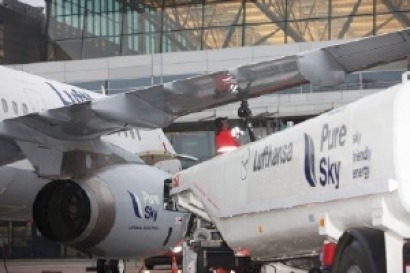
The aviation industry has set itself ambitious targets to contribute to climate protection. In line with the International Air Transport Association’s industry-wide goal, airlines must reduce their net carbon dioxide emissions by 50 per cent by the year 2050 compared to 2005. To this end, Lufthansa is among many airlines testing biofuels in their planes.
In all, Lufthansa operated 1,187 biofuel flights between Hamburg and Frankfurt (Germany) under the burnFAIR project. The planes ran partially on biosynthetic kerosene, with one of their engines being powered by a 50-50 blend of regular fuel and biosynthetic kerosene, which the airline says is just as reliable as conventional jet fuel but has fewer environmental effects.
The principle behind biofuel is simple and is based on the carbon cycle. Plants withdraw carbon dioxide from the atmosphere through photosynthesis. When aircraft engines burn biofuel, this carbon dioxide is released back into the atmosphere. Biofuel, Lufthansa calculates, emits about 50 per cent less carbon dioxide than conventional fossil fuels. Biosynthetic kerosene is also free of sulphur and aromatic compounds. Furthermore, Lufthansa reveals that thanks to the higher energy density of biofuel, it has been possible to reduce the fuel consumption by more than one per cent.
“Our burnFAIR project went off smoothly and to our fullest satisfaction. As expected, biofuel proved its worth in daily flight operations,” confirms Joachim Buse, Vice President Aviation Biofuel at Lufthansa.
Lufthansa announced earlier this month that it would continue its biofuel trials this year with the first scheduled transatlantic flight to the United States due to take place on 12 January 2012. A Boeing 747-400, carrying about 40 tonnes of a biosynthetic fuel mix, was scheduled to fly from Frankfurt to Washington. With this flight alone, Lufthansa expects to reduce carbon dioxide emissions by 38 tonnes, equivalent to the carbon dioxide emissions of six scheduled flights between Frankfurt and Berlin, although the airline has not yet said whether or not this flight took place.
Sustainability issues raise question mark over future of trials
Indeed, in a recent statement, Joachim Buse revealed that the next issue is to ensure a viable supply of sustainable raw materials. “Lufthansa will only continue the practical trial if we are able to secure the volume of sustainable, certified raw materials required in order to maintain routine operations. As a next step, we will focus on the suitability, availability, sustainability and certification of raw materials,” he said.
The issue of sustainability is one which has always been associated with biofuels, especially first-generation fuels. While Lufthansa says it may continue trialling biofuels if a suitable volume of sustainable, certified feedstock can be obtained, Robbie Blake, biofuels campaigner for Friends of the Earth Europe, believes all biofuel trials by the aviation sector should be halted.
“Lufthansa’s bio-fuelled flights should remain grounded permanently – flying with biofuel is unsustainable, full stop. There simply isn’t enough biofuel out there without diverting land and food from hungry communities, and causing worse climate-changing carbon dioxide emissions,” he warns.
“Biofuels exacerbate poverty and hunger, drive land grabbing and deforestation, push up food prices, and make climate change worse. Airlines would do better to fly less, and do so more efficiently, and passengers, between Hamburg and Frankfurt, would be better off on the train,” Blake adds.
Competing with food production
According to Friends of the Earth Europe, sustainable certification schemes are industry led, highly controversial, and are likely to mislead the public, , and the expansion of jatropha crops – part of Lufthansa’s fuel mix – have been instrumental in driving land-grabbing and poor returns for farmers in countries such as Mozambique, Indonesia, and India.
However, other parties believe sustainable biofuels are possible. The Bioenergy and Water Nexus report jointly produced by UNEP, the Oeko-Institut and the International Energy Agency Task 43, for example, finds that while “bioenergy development needs to be carefully planned to avoid it adding to existing pressures” and that “in some cases, these considerations may argue against bioenergy development”, “well-planned bioenergy development can help human development”.
UNEP concludes that careful planning can “improve agricultural practices, including promoting water efficiency and sustainable fertilizer use, and even improve access to water, thanks to water pumping and cleaning powered by bioenergy, and food security in the case of combined food-bioenergy production systems”.
Meanwhile, the European Commission is one authority that believes biofuels can be produced in a sustainable manner. The EC Directive on the promotion of energy from renewable sources passed in April 2009 aims to promote the use of fallow land while preventing the use of ecologically valuable land for the cultivation of biomass.
Companies in the sector also argue against the fuel for food debate. Abengoa for example explains that US corn exports have actually increased despite record bioethanol production, achieving record levels in the 2007/08 marketing year and remaining well above the 10-year average the following year. Corn export levels for 2009/10 are forecasted to be among the highest on record. Additionally, record amount of distillers grains from bioethanol was exported in 2009 to livestock producers around the globe.
ePURE, the European biofuel association estimates that “for every tonne of sugar beet or cereals used for ethanol production, one-third will re-enter the food chain as high protein animal feed or gluten for food and feed applications”.
The on-going controversy in Europe over the indirect land use change (ILUC) impacts of biofuels, the availability of land for food production and the fear over the displacement of food production due to the increased demand for biofuels will no doubt continue until a definitive set of sustainability criteria are devised and measures are put in place to ensure excessive amounts of land in developing countries are not turned over to biofuel feedstock production. In the meantime, airlines like Lufthansa may well continue to trial biofuels.
For additional information:

